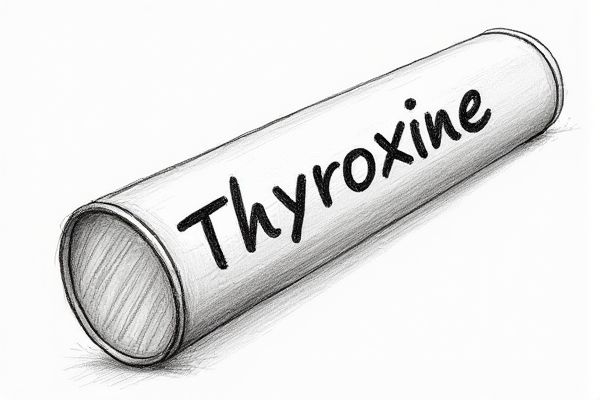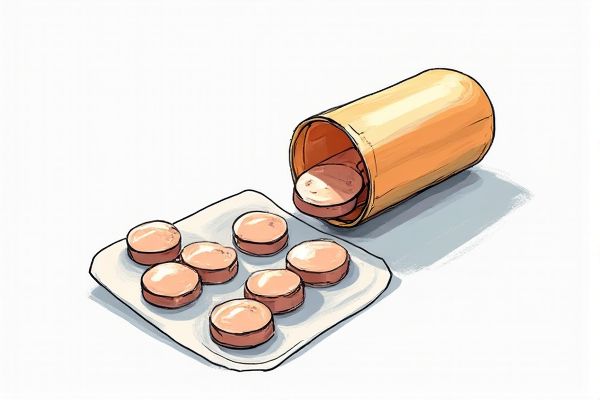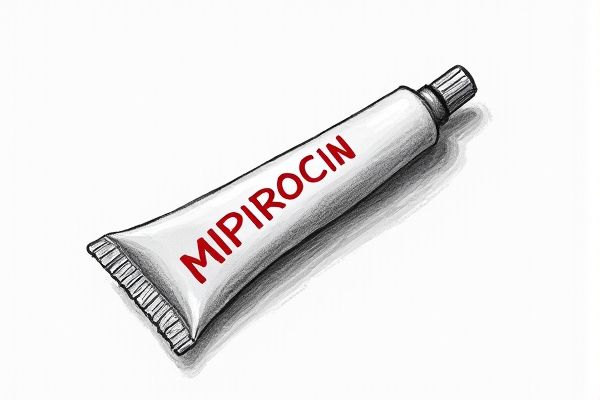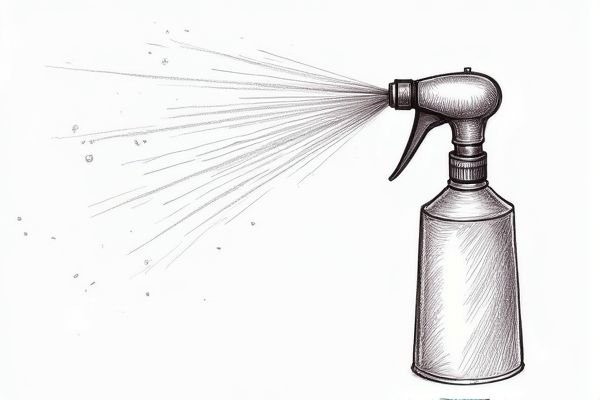Thyroxine, a critical hormone for managing thyroid conditions, is available through various reputable brands around the world. Patients and healthcare providers often emphasize the importance of selecting a brand that ensures consistency and bioavailability for effective treatment. Some of the most trusted brands globally are known for their stringent quality control and adherence to pharmaceutical standards. To find out more about these esteemed brands and make an informed choice for thyroid management, explore the comprehensive list below.

Illustration of thyroxine
Best brands of thyroxine in 2025
Synthroid
Synthroid, manufactured by Abbott Laboratories, is a leading brand in the production of levothyroxine, with a market dominance of 82% as of 2005. It has been the second most commonly prescribed drug in the United States, with sales of $627 million in 2004. Despite the availability of other bioequivalent products like Unithroid, Levo-T, and Levoxyl, Synthroid has maintained its market share due to extensive marketing and support from thyroid associations. The drug has been in use for over 40 years, with its production and distribution changing hands several times since its creation. Synthroid's efficacy and safety have been well-documented, making it a trusted choice for treating hypothyroidism. For more detailed information, you can view the official FDA labeling of Synthroid.
Euthyrox
EUTHYROX is a renowned brand for levothyroxine, a synthetic form of thyroxine (T4), which is chemically identical to the naturally produced hormone by the human thyroid gland. It is widely used for treating hypothyroidism and is distinguished by its precise and protected potency, safeguarded through blister-packaged tablets that protect against light, oxygen, and moisture. Over 53 million patients globally rely on EUTHYROX annually, making it one of the most dispensed levothyroxine brands. Studies have shown that both generic and brand-name levothyroxine products, including EUTHYROX, achieve comparable restoration of normal thyroid levels, with around 75-76% of patients achieving normal TSH levels. EUTHYROX is also notable for its dye-free, lactose-free, and gluten-free formulation, reducing potential adverse effects for sensitive patients. For more detailed information, please visit the official EUTHYROX website.
Levoxyl
Levoxyl, a brand of levothyroxine sodium, is a widely prescribed medication for treating hypothyroidism, goiter, and other thyroid-related conditions. It contains synthetic crystalline L-3,3',5,5'-tetraiodothyronine sodium salt, identical to the T4 hormone produced by the human thyroid gland. Levoxyl is available in 11 different strengths and is used to achieve and maintain a clinical and biochemical euthyroid state. The medication is often prescribed in doses ranging from 12.5 to 25 mcg/day, with adjustments based on clinical and laboratory assessments. Despite its effectiveness, some patients may experience adverse reactions due to changes in formulation or inactive ingredients. For more detailed information, visit the Levoxyl medication page.
Tirosint
Tirosint, a brand of levothyroxine sodium, is renowned for its high bioavailability and flexibility in dosage strengths, making it a preferred choice for hypothyroidism treatment. It is available in 15 different dosage strengths, including new additions such as 37.5, 44, and 62.5 micrograms, enhancing dosage precision. The relative bioavailability of Tirosint capsules is approximately 103% compared to other marketed levothyroxine sodium tablets. Tirosint is particularly noted for its liquid form inside a capsule, which can improve absorption and reduce the impact of dietary factors on bioavailability. This formulation helps in achieving stable serum TSH levels, especially important during pregnancy and in patients with underlying cardiovascular disease.
Unithroid
Unithroid, a brand-name medication, is a highly effective producer of levothyroxine, a synthetic form of thyroxine (T4) that replaces the hormone produced by the thyroid gland, treating hypothyroidism and lowering TSH levels in thyroid cancer patients. It is available in various strengths, ranging from 25 to 300 micrograms, and is chemically identical to the naturally secreted T4. Unithroid has a narrow therapeutic index and requires careful titration to maintain a euthyroid state, with TSH levels ideally between 0.4 and 4.0 mIU/L. The drug has a long half-life of approximately 6 to 7 days in healthy individuals and is converted to the highly active T3 in peripheral tissues. Approximately 23 million Americans take levothyroxine, making it one of the most prescribed drugs in the country. For further details, visit the Unithroid information page.
Levothroid
Levothyroxine, often prescribed under brand names like Levothroid, is a synthetic form of the thyroid hormone thyroxine (T4), widely used to treat hypothyroidism. Studies have shown that generic and brand-name levothyroxine products, including Levothroid, achieve comparable restoration of thyroid levels, with approximately 75.5% to 76.9% of patients achieving normal thyroid status. Levothyroxine is one of the most commonly prescribed medications, with over 82 million prescriptions in the United States in 2022. It is available in various formulations, including tablets, gel caps, and liquid, ensuring flexibility for patient needs. The medication is generally well-tolerated and has a bioavailability of 40-80% when taken orally. For more insights on the therapeutic equivalence of levothyroxine, you can visit the FDA's official page.
Novothyrox
Novothyrox, a brand of levothyroxine sodium, is a highly regarded producer of thyroxine, used as replacement or supplemental therapy in congenital or acquired hypothyroidism of any etiology. It is identical to the thyroxine produced by the human thyroid gland, with an empirical formula of C15H10I4NNaO4*H2O and a molecular weight of 798.86 g/mol. The dosage typically starts at 12.5-25 mcg/day, with increases of 25 mcg/day every 2-4 weeks to normalize TSH levels. Novothyrox was approved by regulatory bodies to ensure therapeutic equivalence, although differences as small as 12.5% in bioavailability can have significant clinical impacts. It is used in various clinical settings, including as an adjunct to surgery and radioiodine therapy in well-differentiated thyroid cancer. For more detailed information, visit their official page on RXList.
Thyronorm
Thyronorm, a brand name for thiamazole, is not a producer of thyroxine but rather a medication used to treat hyperthyroidism in cats by reducing thyroid hormone production. It works by preventing iodide from binding to the enzyme thyroid peroxidase, thus inhibiting the synthesis of T3 and T4. This medication is often used long-term to manage hyperthyroidism and may be adjusted based on regular blood tests to ensure optimal thyroid hormone levels. For more detailed information, you can visit the Thyronorm page on PetLearnia.
Oroxine
Oroxine, a brand of levothyroxine sodium, is a highly regarded treatment for thyroid hormone deficiency, particularly for hypothyroidism. It is available in four different strengths: 50 micrograms, 75 micrograms, 100 micrograms, and 200 micrograms, ensuring a tailored dose for each patient. The medication is bio-equivalent to other brands like Eutroxsig and Levoxine but not interchangeable with Eltroxin, which has a 10% lower active ingredient content. Oroxine tablets are free from gluten, sucrose, and azo dyes, making them suitable for patients with specific dietary restrictions. The leaflet for Oroxine was revised in May 2020, reflecting ongoing updates in medical guidelines. For more details, visit the Oroxine Tablets information page.
Thyronajod
Thyronajod, a brand of levothyroxine, is highly regarded for its consistency and efficacy in treating thyroid hormone deficiency. Levothyroxine, the synthetic form of thyroxine (T4), is chemically identical to the naturally secreted hormone and has a bioavailability of 40-80% when administered orally. It is metabolized mainly in the liver, kidneys, brain, and muscles, with a half-life of 6-7 days in individuals with normal thyroid function. Approximately 70% of secreted T4 is converted to its active metabolite T3 through deiodination, and it is primarily eliminated by the kidneys, with about 20% eliminated in the stool. Proper dosing of levothyroxine, such as that provided by Thyronajod, helps maintain TSH and free T4 levels within normal ranges, ensuring symptomatic relief for patients.
















Leave a Reply
Your email address will not be published.